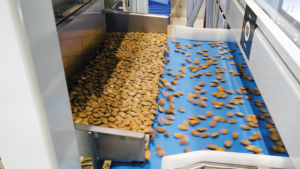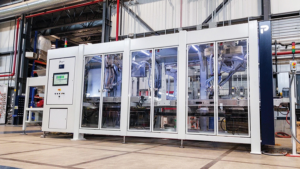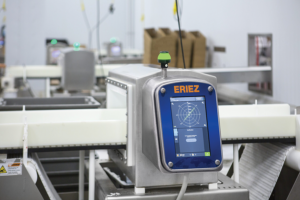Machine evolution: AI paving path for production line advances
The technology Eric Pflueger witnessed firsthand this past December has been more than a decade in the making.
Eric Pflueger, sales manager, agriculture market sector for Premier Tech Systems and Automation, attended The Almond Conference in Sacramento, California, Dec. 5-7. There, he saw innovation he began championing years ago at work.
Premier Tech’s PRAIRIE SCP-2100 robotic nut sorting machine drew quite a crowd, Pflueger said. The artificial intelligence- assisted machine, which can process up to 5,000 pounds per hour, removes defects from nuts including almonds and pecans, and sorts the product into multiple streams.

“Whenever we ran the piece of equipment, our booth couldn’t have been more busy,” Pflueger told Produce Processing. “It’s fun to watch. The robots move. That’s relatively new to people in this industry. They’ve seen big robots putting boxes on the pallet, but we’ve never seen them really do this. Most robots are told to do something: ‘Move the box over there,’ and it puts it down over there. Somebody programs that in, and the robot makes that same movement back and forth, all the time.
“These are often operating live, meaning it gets an image and it’s told where to go to get it.”
The machine also represents AI advances that Pflueger sees as the tip of a technology iceberg.
“The reason is the data we collect,” he said. “You don’t know what questions to ask just yet because it is new. We get so much data, we don’t really know how the customer wants to use all of that yet.”
The robotic nut sorting machine is just one example of new tech aimed at making start-of-line processes and overall production line functions faster, less expensive and safer.
ALMOND APPLICATION
Pflueger got in on the ground floor of introducing AI to nut sorting at Premier Tech.
“I’ve been working on this since the beginning. This was, good or bad, kind of my idea to do this with almonds,” he said. “I’ve been watching them (the machines) for 10 years, and when it’s working right, it still blows me away, and it is fun to watch. It’s very fast. Each robot can do — we say 150, 200, but I’ve watched them do well over 200 picks a minute.”
The first robotic sorting technology Pflueger encountered was designed to handle ears of corn. He immediately wondered if the tech could be applied to almonds, but worried that the nuts’ smaller size could be problematic.
“It actually made it easier,” he said. “Say you’ve got a 10-inch long piece of corn. If the defect’s on the very end, that’s where the robot wanted to go. Trying to pick an ear of corn up from the end is very difficult. With AI and then the almonds, we see the almond, we see the defect, and then go to the middle of the almond. So that was a big help.”

Another key resource-enhancing component of the PRAIRIE SCP-2100, Pflueger said, is its ability to separate defects into three categories.
“Most sorting pieces of equipment just sort everything into one bin. We take the individual rejects and separate them,” he said.
That process separates rejects into trash, nuts to be sold for milk or candy, and products to be sold for animal food.
“It saves (customers) a nickel a pound later,” Pflueger said. “If you pick out a few hundred pounds of nuts a day, at the end of the season, you’ve got a half million pounds or a million pounds to re-run. At a nickel a pound, well …”
The three-way separation also saves time, Pflueger said, and labor costs, as humans are no longer required to perform repetitive tasks.
A NEW KIND OF WORKER
With companies competing for workers — especially in California, where the minimum wage increased to $16 an hour in January — the jobs rendered unnecessary by AI are ones that are difficult to fill anyway, Pflueger said.
“What it does, though, is create a higher-paying job,” Pflueger said. “Somebody’s got to learn how to use this. Somebody’s got to be able to operate it. Somebody’s got to learn some of the maintenance. There won’t be as many jobs, and that’s where we save the labor.
“Now we’re going to have somebody that’s a little bit higher up the pay scale that’s going to be in charge of the system and keeping it running.”
Pflueger pointed out, however, that that system — contrary to some impressions — doesn’t actually learn the same way humans do.
“It figures things out on its own, and by that, what I mean is that we teach it something,” he said. “It’s going to try and fit whatever you push through it into one of the boxes you’ve given it to choose from. It will take all the data points and get it to the box closest to what it thinks it is. If it’s wrong, it’ll look for a different box. That’s the learning part of it.
“People are afraid of this stuff — ‘It’s going to take over the world!’ No. It’s only going to do what people tell it to do.”
START-OF-LINE ADVANCES
Pennsylvania-based separation technology company Eriez is also a pioneer in AI-assisted sorting.
In 2019, Eriez debuted the NanoRanch AI Sorter, which uses vision to identify and sort a customizable range of nonferrous materials. The sorter provides greater than 95% accuracy when the machine is trained with samples, according to the company, and has a capacity of 1,000 pounds per hour. Eriez, founded in 1942, offers cutting-edge metal detection in industries from mining to pharmaceuticals. Within the food industry, including produce and nuts, its equipment solutions include three main product groups: magnetic separation, metal detection and vibratory feeding and screening.

“All three of those products can be found in both the produce and nut industry from start to finish — coming out of the fields all the way to the finished packaged product going out the door,” Eric Confer, Eriez market manager – light industries, said.
Food processing equipment manufacturer Key Technology is targeting start-of-line contaminants with new features for its rotary sizing and grading systems.
The features, including the precision size grader, rotary size grader and sliver sizer remover, allow processors and packers to mechanically size and grade product while removing small debris.
“We’re always developing new ways to improve our popular, field-proven equipment to optimize it for the modern age,” Jack Lee, Duravant group president – Food Sorting and Handling Solutions, said in a news release. “By advancing our technology, we offer our customers the very best solutions for solving current as well as future production challenges.”
DATA-DRIVEN FUTURE
The challenge now, Pflueger said, is figuring out how to interpret all the data available.
“The mechanical portion — the vision, how we see it, the robots, how they move, and all the different time settings and the motions that they make — we’ve got that down, pretty much, to a science,” he said. “Now it’s just what we want to do with all the data we collect. The customers have been helping us with that. They’ll say, ‘Well, if I can do this, what can I do with that?’
“It’s got to be useful to them. You don’t just want a bunch of useless data.”







